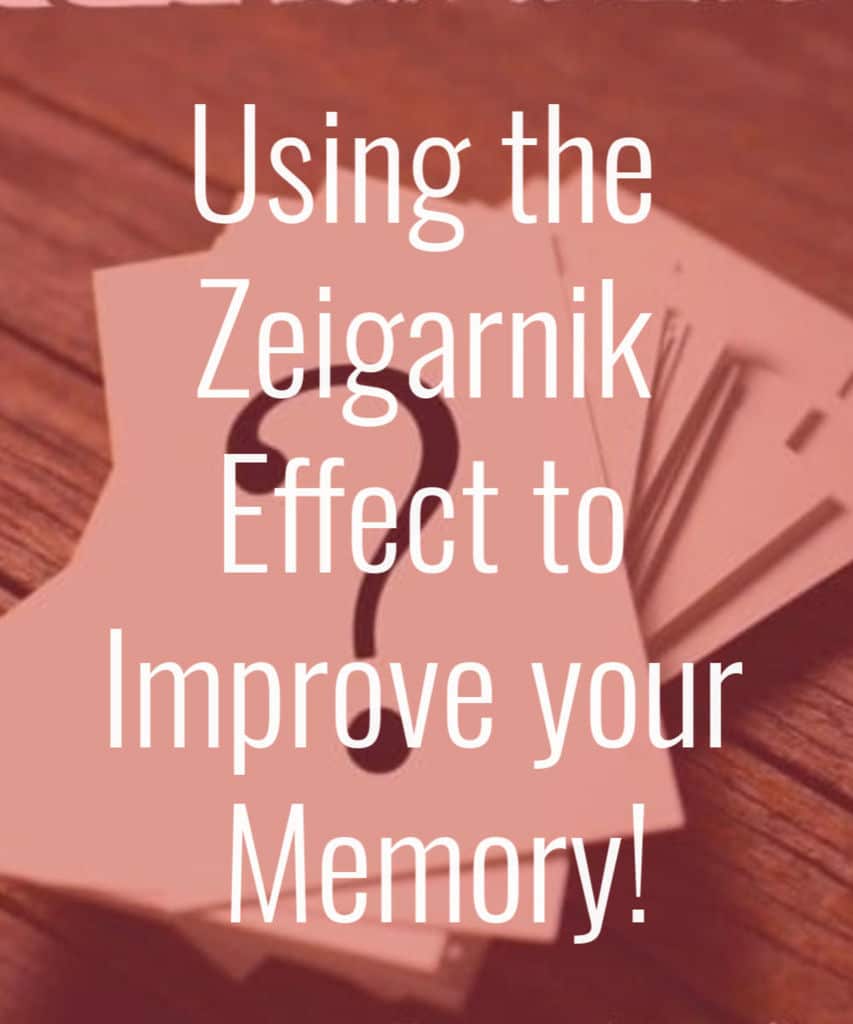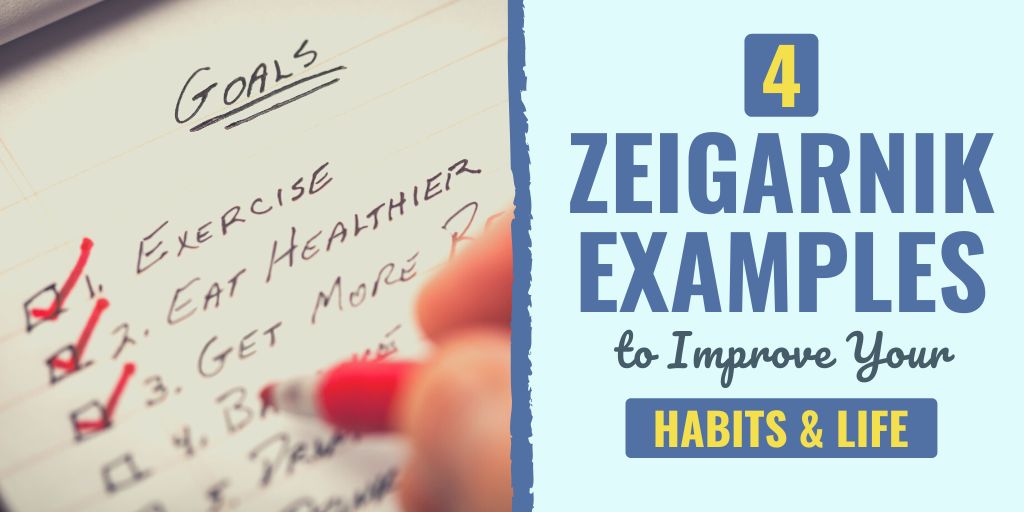There might be affiliate links on this page, which means we get a small commission of anything you buy. As an Amazon Associate we earn from qualifying purchases. Please do your own research before making any online purchase.
Want a simple hack to quickly improve your life?
One trick is to lean on a psychological concept known as the Zeigarnik
In this article, I am going to detail the Zeigarnik effect and how you can use it to improve your life. Let’s get started by taking a deeper look at the details behind the discovery of this behavior.
What is the Zeigarnik Effect?
The Zeigarnik Effect is a phenomenon where people tend to remember unfinished tasks better than completed tasks. Applied the right way, the open loops caused by the Zeigarnik can help you take consistent action on the habits you want to build.
Here’s a little background about this concept…
While dining at a restaurant with her friends in the 1920s, Dr. Bluma Wulfovna Zeigarnik was impressed as she noticed the waitstaff’s ability to easily remember long and complex orders from patrons. But, once the orders were paid for, the waitstaff could not recall any details about what people had ordered.
It was as if they tightly held onto that information and as soon as the order was passed onto the kitchen, they let go and forgot it.
Zeigarnik went on to actively study this psychological tendency.
She continued to find that people were more inclined to better recall about tasks that were still in progress than tasks that had been completed.
Once you begin a task, your mind develops a task-specific tension, making it easier for your brain to recall any relevant information. If you get interrupted while you’re working or you need to put the project aside for a while, the tension remains, which means you are still able to easily access pertinent content.
However, once the task is finished, this cognitive tension is relieved.
The pervasive thoughts that you experience regarding uncompleted tasks often motivate you to go back and complete a task. Even if you try to move on to something else, incomplete work can create intrusive thoughts that bother you until you that task is complete.
As an example, think about how marketing companies use the Zeigarnik effect to motivate consumers.
I’m sure you’ve seen ads online that you can’t help but click on. These “clickbait” ads are one of the most effective ways for companies to grab consumers’ attention–even in a society where everything is competing for your time.
Here’s an example: “Snored to Death: How Sleep Apnea can be Fatal.”
If you know someone who snores–which you probably do–you’re likely going to click on this link to find the resolution.
Let's look at a major difference between binging on a Netflix show. With Netflix you get complete shows you can watch all at once. But a month after you finish a series you might have a tough time remembering what happened.
With other streamers,the episodic nature (and cliffhangers) means you think about it a lot week-to-week because it becomes one of the uncompleted tasks that demand a conclusion in your attention.
This simple psychological phenomena has a large impact on self improvement. By understanding how to use the Zeigarnik Effect you can improve your life in many ways.
Such as:
So, how can you apply the Zeigarnik effect to your life?
Here are four examples of how you can use this concept to help with your personal development.
Let’s take a look.
1. Improve Your Recall
Zeigarnik’s research gave other psychologists great insight into how memory works.
Information is typically stored in sensory memory for a short period of time as soon as you take it in. If you pay particular attention to the information, it may remain in your short-term memory. While most of these memories are soon forgotten, if you are actively rehearsing the information, it can progress onto your long-term memory.
Remember the cognitive tension that we mentioned earlier that allows you to easily retrieve information about an unfinished task?
This tension causes you to use more mental energy as you continue to recap the information in your head so you can keep it in the forefront of your mind.

This means that the Zeigarnik effect supports the idea of taking breaks or being interrupted while working on a project to help increase your ability to retain information.
So, let’s say you’re studying for a test. Rather than trying to learn all of the information the night before, it is far better to to stretch the learn out over multiple study sessions.
This way the Zeigarnik effect works for you because the tension of the incomplete lessons helps you remember what you learned during the test.
To learn more, check out this step-by-step guide on how to create a study plan that ensures maximum recall.
2. Increase Your Motivation
Having a few goals, both long term and short term that are incomplete helps you to stay motivated.
If you have a goal in mind that you want to accomplish, even if you are working on something entirely unrelated, you will still think of that goal until it is complete. And, having these intrusive thoughts routinely pop into your mind will make you want to achieve the goal even more.
Incomplete tasks that you have set as personal goals occupy a lot of premium space in your mind and use up your mental resources, which can take away from other things you’re working on in your life.
And, because your brain thinks that incomplete tasks are significant, these thoughts will refuse to stop until you complete the task.
So when you need an extra boost of motivation to accomplish a goal, try working on it in smaller portions. These simple tasks will help make certain that you will experience these intrusive thoughts about your goal until it is attained.
To learn more, watch this video on how to turn your goals into actionable daily habits:
3. Reduce Procrastination Habit
It’s not uncommon for people to wait until the last minute to mail in their taxes or complete a project that has a deadline. But procrastination not only causes stress, it can also lead to mistakes as you rush through your work, and possibly a poor performance review.
If you take the Zeigarnik effect into consideration, you will be more likely to take the first step to completing an assignment long before it’s due–even simple tasks.
After you have started the project, you will find that you keep thinking about the unfinished work until it is completed.
Every little step you take to work on the project brings you closer to completion, which will not only give you the motivation that you need to finish it, but also free up your mental capacity, allowing you to start working on other tasks.
Now, if you struggle with procrastination, here are 14 simple techniques you can use in conjunction with the Zeigarnik effect to overcome it.
4. Skyrocket Your Productivity
Further studies of the Zeigarnik effect, by Roy Baumeister shed light on how simply knowing about the Zeigarnik effect can increase your productivity.
Their studies found that people have a hard time starting new tasks if they still had uncompleted tasks in the forefront of their memory.
To remedy this, researchers had participants write down specific plans to complete their initial task on a later date, Writing the task down like this erased the distraction and intruding thoughts about incomplete tasks.
Stress can be a negative consequence of the Zeigarnik effect. We think about incomplete tasks, which lead to undue stress. But by knowing about the Zeigarnick effect we can intentionally complete tasks before starting new tasks. Allowing you to give your complete focus to the task at hand.
Write everything down that you still need to work on to help close the mental loops in order to reduce the mental strain that unfinished business can cause.

A variety of elements that can impact your ability to recall information about your projects, but try taking purposeful breaks the next time you’re powering through a task.
You may realize that it is easier to recall relevant information about the project, feel motivated to complete a task, and help you get the work done faster.
My recommendation is to map out your projects and take daily action through an app called Todoist. And here is a step-by-step guide on how to use the Todoist platform.
Final Thoughts on the Zeigarnik Effect
As you’ve learned, the Zeigarnik effect can help you remember the open loops in your life. The trick is to use this concept to focus on the areas that you want to improve.
My suggestion?
Pick one or two habits that you want to focus on, then use a habit tracking app (like Todoist) to create a reminder, and once you set up this system, you’ll find a need in the back of your mind to complete and check them off from your list.
And to get started with building habits, check out this step-by-step plan on how to create habits that stick.

Connie Mathers is a professional editor and freelance writer. She holds a Bachelor's Degree in Marketing and a Master’s Degree in Social Work. When she is not writing, Connie is either spending time with her daughter and two dogs, running, or working at her full-time job as a social worker in Richmond, VA.



Hi SJ,
This was an excellent post and thanks for sharing information about the Zeigarnik Effect. I wasn’t aware of this before.
I can really appreciate what you wrote about switching to creating plan when something keeps poping up in our minds. I can see how this would work to help remove any discomfort from being bogged down by too many activities we think we should be doing.
Thank you.
Yeah, I had a problem for a long-time where I’d get mentally stuck on incomplete tasks. But, writing everything down and setting a date to close this loop was really helped stay focused with what I have to do.
My 5 cents, as usual 😉
I’ve developed unconscously the habit of carrying a pen and a notepad always with me. Maybe that’s a reason of my success ratio in habits development.
Writing down is just a part of the process. Point 2 – organize and process notes – is crucial. Your mind will not give up the task, even written down, if it won’t “trust” you, that you will check on this item later.
I struggled with adopting Allen’s system long time because of that. I tried different means of capturing ideas and projects till I stopped at the simple paper pocket notepad.
Love to get your 5 cents Michal. It is great to have regular commentators, so thanks for that!
You are right, it is about more than “write it down and forget it” you have to KNOW you will take action in time. Great additional clarification!
Hey S.J.
I took a class on decision science last spring that touched on the Zeigarnik Effect, and it’s amazing how once you know about it GTD makes a lot more sense. I actually bought a moleskine notebook that I carry around with me everywhere so that whenever I have a random idea I can write it down to come back to it later–it helps a lot!
What I’ll then do is go through my notebook every night and pull out the ideas and thoughts that I want to come back to later and put them in evernote, and cross everything out that isn’t relevant or actionable. I think it’s actually made me better at idea generation over time.
Nat
Nat,
Nothing like having notebook with you at all times. I always have one with mne most times, and have my cell to take notes the few times I don’t. It is funny, I get my best ideas when I am not TRYING to get ideas. This is YET ANOTHER reason why note-taking is great. It not only clears your mind, but gives you a vehicle for those wonderful ideas you might otherwise lose.
This is a very interesting take on this idea. I’ve heard of this psychological effect before, but I didn’t think to apply it to habits like this. I can see how you could put this to good use. I can also see why it would weigh you down. When you have all those unfinished things floating around your head, you can’t get past them. They get stuck in your head like a bad song. Oh, and by the way, I now have “Moves Like Jagger” going on in my head. Although i don’t mind that song so it probably won’t last.
It might be especially useful for someone like me who has a mind that races from topic to topic. Maybe I should cut out all the noise and get more things done and stop them from bouncing around my head unfinished. I might be able to focus a little more which would help me get more tasks done overall too.
Wow – This explains something that I’ve always struggled with! I had never heard of this Zeigarnik effect before today but ALWAYS when a song I’m listening too gets cut off, for whatever reason, I HAVE to go back and finish it or it won’t leave my head. I’ve done this for years and didn’t know it was a common problem or that it had a name.